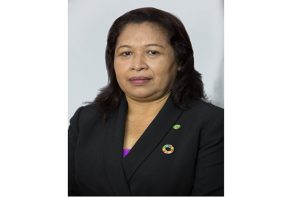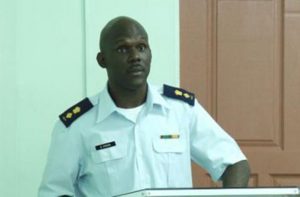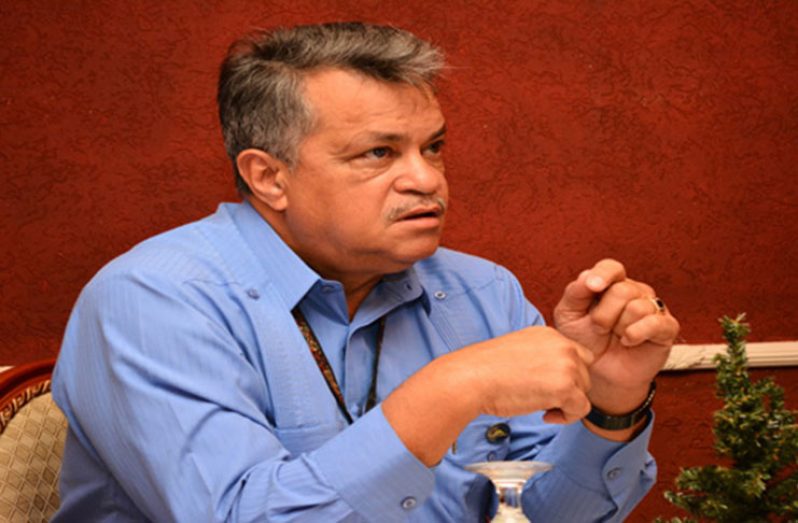— to help The Bahamas in time of crisis
COGNISANT of the challenges The Bahamas is facing, having been ravished by Hurricane Dorian, the Private Sector has pledged to support the Civil Defence Commission’s (CDC) efforts to provide much-needed assistance to the Bahamians.

The Private Sector Commission (PSC), led by Chairman, Captain Gerry Gouveia, met with Minister of State, Dawn Hastings-Williams; CDC Director-General, Lieutenant Colonel Kester Craig and CDC’s Senior Response Officer, Captain Salim October, at the PSC’s Waterloo Street Head-office on Thursday.
On Sunday, September 1, 2019, Hurricane Dorian, a Category Five storm, made landfall on The Bahamas at Elbow Cay, Abacos Islands, at approximately 12:40 pm with 185 mph winds. The Abacos Islands and Grand Bahama, which collectively have a population of approximately 76,000 people, have been severely affected. The CDC has since activated its ‘response mechanism’ and will provide such support through the Caribbean Disaster Emergency Management Agency (CDEMA).
Captain Gouveia, on Thursday, said the Private Sector stands ready to offer its support to the CDC to bring relief to Bahamians as was done in 2017 when Category Five Hurricanes, Irma and Maria, struck the US Virgin Islands, Puerto Rico, Antigua and Barbuda and Dominica.
“We certainly will be working with you now as much as we could,” the PSC chairman told Minister Hastings-Williams and the CDC director-general.
“This is about a piece of humanity that we need to keep, digging deeper and deeper because this is really beyond the control of human beings, what is happening on the face of the earth, and whatever we can do, we have [to] dig deeper to keep showing that face and hand of humanity because we never know when we are going to be on the other end of this,” Captain Gouveia said.
PSC Secretary, Ramesh Dookhoo, who would have worked closely with the CDC during its 2017 efforts, underscored the importance of ascertaining the needs of The Bahamas to prevent the duplication of resources or the supply of unwanted materials.
NEEDS LIST
The ‘needs list,’ Dookhoo noted, will be shared among members of the business community once provided.
“We need to see that list and we will assist you to circulate that list to about 5,000 businesses right across Guyana… Our strength in this is to appeal to these businesses and you may be surprised about what it can yield. Communicating with them is very easy but it is also very effective and we can do that effectively for you,” Dookhoo told the CDC.
Pumps, reverse osmosis plants, generators, tents, hygiene kits, potable water, non-perishable food items and water containers are among the items on the needs list, which the CDC has committed to making public soon. Early on in the discussion, the CDC officials informed the Private Sector Commission that the Bahamian Government has indicated a preference for financial support.
Wesley Kirton, a member of the PSC, supported the move for cash donations, noting that it would be easier and cost-efficient to wire finance to the Bahamas than to ship containers of items to the islands. He noted, too, that companies with partners or branches in the US can have items shipped from the US to The Bahamas. Purchasing of items in the US can also result in tax waivers and or price reductions or discounts, he further posited. His proposition was endorsed by Major General (Ret’d) Norman McLean, one of the PSC executives present.
Already, GBTI has pledged $3M in hurricane relief. A representative of Edward B Beharry & Co Ltd, which has a majority control of GBTI, was present at the meeting and renewed the company’s support. The National Milling Company of Guyana Inc. (NAMILCO) was also represented at the meeting and pledged that company’s support.
ENCOURAGED
The minister of state said she was encouraged by the Private Sector’s response to the CDC’s call for assistance. Minister Hastings-Williams also used the platform to thank the PSC for its continuous support.
“… you have supported us in the past both locally and internationally whenever you were called upon… you have always supported us, and I must say thank you very much, on behalf of the government, for your support, and we look forward for your continued support,” she told the PSC.

The minister informed the commission that the government has already committed to rendering assistance to the Bahamian Government. She noted that many of Guyana’s teachers are living in The Bahamas, and are more than likely affected by the storm. “I know a lot of our teachers are there, so we sympathise with them,” the minister said.
Meanwhile, in giving a synopsis of the situation in The Bahamas, Captain October told the officials present that Dorian made its landfall as a Category Five Hurricane on September 1.
“Interestingly enough, its maximum sustained winds was the highest recorded on the Islands of The Bahamas to date in its history,” Captain October said while noting that it was a slow-moving hurricane that sustained its 185 mph winds for one and a half day – travelling 30 miles in the northern Bahamas. He confirmed, too, that the Abacos Islands and Grand Bahama have been severely affected.
“We anticipate that while there are seven confirmed deaths, there can be reports of much more as the assessment progress. The assessment is only in its second day so far, search and rescue efforts are still highly afoot, and parts of the Abacos have been totally decimated,” he reported.
The CDC senior response officer pointed out, too, that a shanty town called ‘The Mud,’ which was owned by Haitian immigrants, was completely decimated. Additionally, approximately 60 per cent of the homes in March Habour are damaged. “Water and sanitation are currently compromised on those two islands,” he further reported while explaining that “a large per cent of water that is consumed on the island has to be treated through reverse osmosis plants and therefore if the water system is contaminated, those plants will not function properly.” A number of the reverse osmosis plants have also been destroyed.



.jpg)








